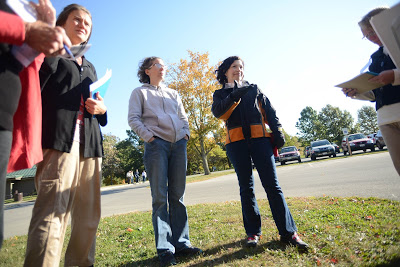
The sleuthing was part of a rain garden talk IISG Stormwater Specialist Eliana Brown (pictured fourth from left) presented to 42 students enrolled in the East Central Illinois Master Naturalist program given through University of Illinois Extension.
 Adrienne Gulley, IISG pollution prevention outreach specialist, (pictured handing out pens) closed out the session with a presentation on natural lawn care and the Lawn to Lake program.
Adrienne Gulley, IISG pollution prevention outreach specialist, (pictured handing out pens) closed out the session with a presentation on natural lawn care and the Lawn to Lake program.The East Central Illinois Master Naturalist training sessions are typically offered one day a week over a two-month period and are led by expert educators in the region.
Approximately 70 hours of classroom instruction and field study and 60 hours of volunteer work are required to complete the program and become certified. In order to remain a certified Master Naturalist, 30 hours of volunteer work and 10 hours of continuing education or advanced training are required each year.

